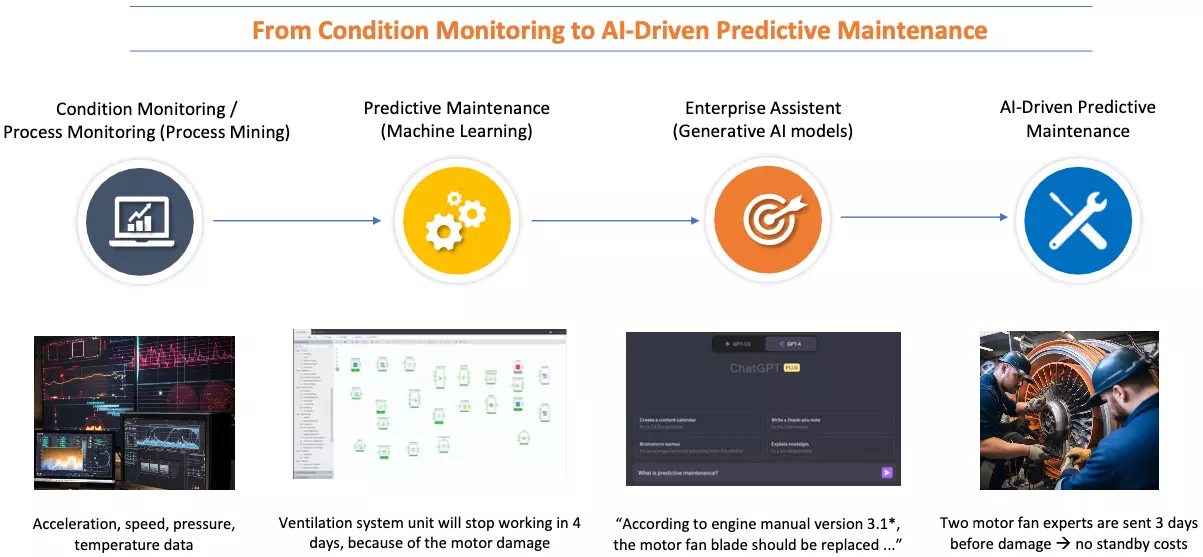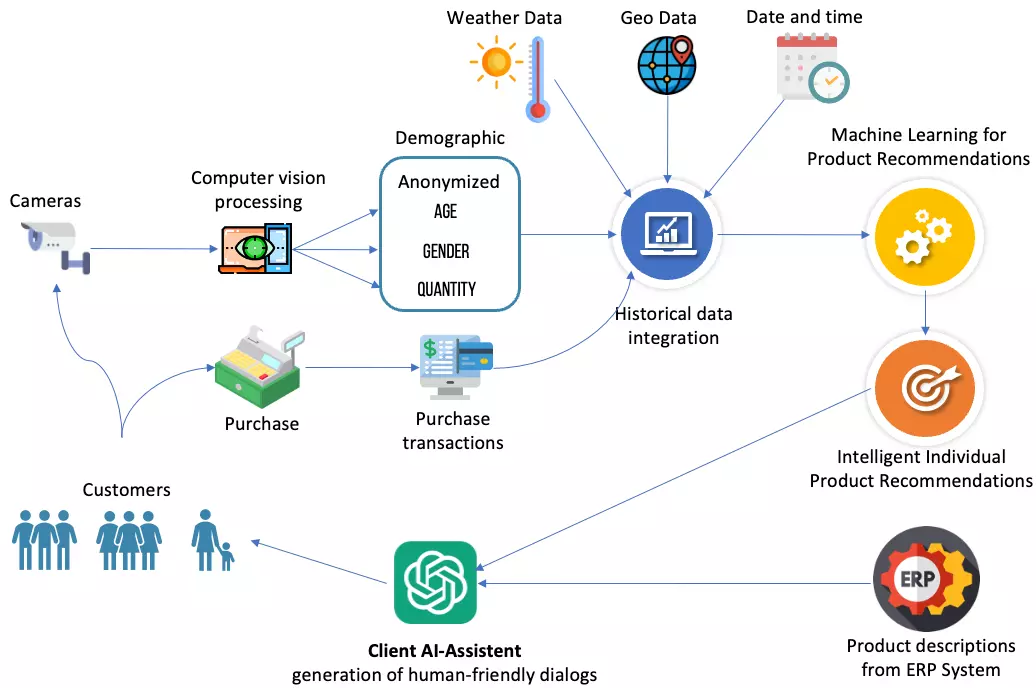Generative AI in Action: Real-Life Use Cases
Welcome to our blog, your gateway to the captivating realm of Generative AI. In this blog, you'll explore real-life use cases across various application areas, from knowledge management to travel and fashion. By the end of this blog, you will discover how Generative AI can enhance Predictive Maintenance and Customer Segmentation.
- Introduction
-
Overview of various use cases
- AI-Driven Predictive Maintenance
- AI-Driven Customer Segmentation and Recommendations
Introduction
In the ever-evolving landscape of enterprise operations, generative AI stands out as a multifaceted tool, equipped to offer solutions tailored for distinct business challenges. A notable application is (1) in personalised content generation for marketing campaigns. By harnessing language models such as GPT-*, firms can adeptly craft customised email sequences and promotional materials, enhancing their engagement with consumers. Within the domain of (2) predictive maintenance, generative models can recreate diverse equipment failure scenarios and suggest preventive measures, empowering organisations to preemptively tackle potential malfunctions. In the financial sector, generative AI's prowess extends to (3) risk modelling — enabling the simulation of various financial scenarios to better forecast and mitigate the impacts of economic downturns. As the enterprise world increasingly acknowledges the transformative capabilities of generative AI, its integration into business processes transitions from being a mere possibility to an essential strategy.
Overview of various use cases
Here is a short overview of several relevant AI use cases from very different application areas, such as knowledge management, travelling and fashion.
Enterprise Knowledge Management
 Enterprises are in the nascent stages of integrating AI into their operational
fabric. Yet, a significant fraction of the workforce already discerns the advantages
of harnessing large language models for knowledge management. These models
facilitate the structuring of enterprise knowledge, paving the way for advanced
semantic searches across organisational documents. Beyond mere document retrieval,
bespoke enterprise chat models have been instrumental in enhancing employees'
efficiency and precision in document-related tasks and intra-organizational
communication. Significantly, when faced with the departure of key personnel, these
text models serve as invaluable tools, simplifying the process of knowledge transfer
and ensuring that institutional wisdom is not lost.
Enterprises are in the nascent stages of integrating AI into their operational
fabric. Yet, a significant fraction of the workforce already discerns the advantages
of harnessing large language models for knowledge management. These models
facilitate the structuring of enterprise knowledge, paving the way for advanced
semantic searches across organisational documents. Beyond mere document retrieval,
bespoke enterprise chat models have been instrumental in enhancing employees'
efficiency and precision in document-related tasks and intra-organizational
communication. Significantly, when faced with the departure of key personnel, these
text models serve as invaluable tools, simplifying the process of knowledge transfer
and ensuring that institutional wisdom is not lost.
Intelligent Travel Assistants
 In the near future, travel planning will undergo a revolutionary transformation,
moving away from the traditional confines of static search parameters such as dates,
destinations, and room categories. The rise of AI-driven platforms will shift the
paradigm towards a more interactive and intuitive search approach. Travellers will
be able to engage in dynamic dialogues with intelligent AI travel assistants.
Powered by sophisticated language models, these virtual consultants will grasp the
nuances of travellers' desires and criteria. Instead of being limited to set
parameters, individuals will articulate wishes like "a secluded beach resort in the
off-peak season" or "a city tour rich in cultural and culinary experiences." Through
these dialogues, AI assistants will curate tailored travel suggestions, ensuring
that every journey is as unique as the person undertaking it. This future of
dialogue-driven travel search promises not just enhanced customization but also a
more efficient and delightful planning experience.
In the near future, travel planning will undergo a revolutionary transformation,
moving away from the traditional confines of static search parameters such as dates,
destinations, and room categories. The rise of AI-driven platforms will shift the
paradigm towards a more interactive and intuitive search approach. Travellers will
be able to engage in dynamic dialogues with intelligent AI travel assistants.
Powered by sophisticated language models, these virtual consultants will grasp the
nuances of travellers' desires and criteria. Instead of being limited to set
parameters, individuals will articulate wishes like "a secluded beach resort in the
off-peak season" or "a city tour rich in cultural and culinary experiences." Through
these dialogues, AI assistants will curate tailored travel suggestions, ensuring
that every journey is as unique as the person undertaking it. This future of
dialogue-driven travel search promises not just enhanced customization but also a
more efficient and delightful planning experience.
Fashion Design Assistants
 In the foreseeable future, the fashion and retail industry will experience a radical
reinvention powered by generative AI. Traditional retail experiences, defined by
fixed catalogues and season-based collections, will give way to a more dynamic,
personalised approach. Shoppers will collaborate with AI-powered design assistants
to create outfits that resonate with their personal style, body type, and occasion
needs. Instead of sifting through countless racks or web pages, customers will
simply convey their preferences, like "a summer dress with a vintage vibe" or "an
ensemble fit for a winter wedding." These AI models, rich in understanding textiles,
cuts, and global fashion trends, will generate bespoke design sketches in real time.
This move toward an interactive, dialogue-driven fashion design process will not
only cater to individual preferences but also redefine sustainability, by producing
clothing items on demand, reducing overproduction and waste. The era of
one-size-fits-all in fashion retail will be eclipsed by a world where every piece is
as unique as the person wearing it.
In the foreseeable future, the fashion and retail industry will experience a radical
reinvention powered by generative AI. Traditional retail experiences, defined by
fixed catalogues and season-based collections, will give way to a more dynamic,
personalised approach. Shoppers will collaborate with AI-powered design assistants
to create outfits that resonate with their personal style, body type, and occasion
needs. Instead of sifting through countless racks or web pages, customers will
simply convey their preferences, like "a summer dress with a vintage vibe" or "an
ensemble fit for a winter wedding." These AI models, rich in understanding textiles,
cuts, and global fashion trends, will generate bespoke design sketches in real time.
This move toward an interactive, dialogue-driven fashion design process will not
only cater to individual preferences but also redefine sustainability, by producing
clothing items on demand, reducing overproduction and waste. The era of
one-size-fits-all in fashion retail will be eclipsed by a world where every piece is
as unique as the person wearing it.
AI-Driven Predictive Maintenance
In our recent endeavours in the realm of predictive maintenance, we've gleaned significant insights. A salient observation has been the transformative potential of generative AI in redefining the traditional maintenance process. By seamlessly integrating an enterprise maintenance assistant powered by AI, we’ve managed to elevate the entire procedure. This enhanced approach begins with meticulous condition monitoring, paving the way for adept predictive maintenance utilising cutting-edge machine learning techniques.
The integration doesn't stop at prediction. In fact, the confluence of machine learning and generative AI provides an opportunity to push boundaries further. Assisting teams in real-time, these AI models are fine-tuned to offer actionable insights and precise guidelines during the maintenance process, ensuring optimal outcomes and reduced downtime. Referencing figure below, we showcase the iterative flow and efficiency gains achieved when such models are put into play. Through such projects, we've witnessed the dawn of a new era in predictive maintenance—one that's driven by intelligence and precision.

AI-Driven Predictive Maintenance Process
In our recent collaboration with a storied European enterprise specialising in machine construction and development — with a history spanning over a century and a workforce exceeding 200 employees — we embarked on a transformative journey to modernise their maintenance processes. Our proposed solution involved the establishment of robust data pipelines, stringent measures for data quality and cleansing, and the introduction of cloud-based dashboards tailored for real-time monitoring and dispensing essential guidelines. Additionally, we harnessed the capabilities of GPT* models, fine-tuning them with comprehensive operating instructions specific to the company's machinery.
As a result of these integrations, the enterprise now boasts a clear overview of equipment failures, understanding both their immediate repercussions and the associated operating and downtime costs. Furthermore, the tailored guidelines we provided have become invaluable assets for the company's management and operations managers. Most notably, the inclusion of a maintenance assistant ensures prompt and efficient repairs, significantly reducing downtimes and bolstering operational efficiency.
AI-Driven Customer Segmentation and Recommendations
Another use case from the retail sector is AI-driven customer segmentation and personalised recommendations. In recent years, we've developed an AI-service Cusaas (Customer Segmentation as a Service) aimed at enhancing the personalization of customer interactions. By utilising customer segmentation and analysing customer behaviours, combined with specific product recommendations, this service effectively presents product suggestions tailored to the individual customer.
With the incorporation of generative AI, we further enhance the customer interaction process. Instead of just displaying product recommendations in search results or on web interfaces, they are presented by a personal customer assistant. This AI-driven assistant is well-informed about both the customer and the products, offering detailed information about the products' main attributes and features.
In the subsequent figure, we present the architecture of Cusaas, developed in collaboration with a globally renowned electronics and technology company. This venture aimed to redefine the customer experience paradigm within the retail sector. Our solution amalgamates data from various sources: store cameras, demographic insights from CRM, customer purchase histories from E-Commerce and DWH systems, as well as contextual data such as weather conditions and geographical location. This multifaceted data stream is then employed to craft personal product recommendations for shoppers. But our process doesn't stop there. These tailored product recommendations, combined with specific product descriptions from ERP systems, are supplied to a generative AI assistant, underpinned by fine-tuned LLMs. This assistant can then display bespoke messages to shoppers via large digital signage systems, further enhancing customer engagement.

Cusaas based on AI stands as a transformative tool in the realm of retail, redefining how businesses engage with their customers. By seamlessly integrating varied data sources and utilising the power of generative AI, it facilitates a more intimate and tailored shopping experience. Customers are no longer mere recipients of generic advertisements; instead, they are engaged with personalised product recommendations and messages that resonate with their preferences and context. This not only enhances the overall customer experience but also fosters deeper loyalty and trust. As businesses continuously seek to differentiate themselves in a competitive market, embracing services like Cusaas offers a distinct advantage, placing customer engagement and satisfaction at the forefront of their strategy.




